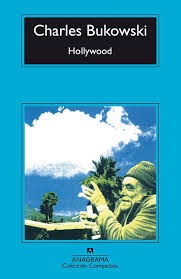
Original language: English
Original title: Hollywood
Translation: Cecilia Ceriani
Year of publication: 1989
Valuation: Alright
I don’t think I’m very wrong if I say that almost all of us have tasted Bukowski to some extent in our youth. He is irresistible, all that dirty realism, talking openly about sex, alcohol, books in which he says he fuck y Fuck you, antisocial types who laugh at conventions. A kind of cynical version of Kerouac, a Borroughs on a return trip. An appetizing cocktail for someone eager to know the dark side of vice, risk and fights. Many years later we take a look at those stories and, of course, they are much less impressive, but can they still be attractive?
A film director commissions Bukowski (or his inevitable alter ego) Chinese) to write a script. After some hesitation he manages to pull it off, and now it’s time to make the film. It’s all difficulties with producers and actors, with financing and the whims of the industry, problems that the screenwriter contemplates from a certain distance, more linked to the project by friendship than by genuine interest (aside from the financial one, of course). The multiple vicissitudes that occur, some of them crazy but seeming to be very real, constitute the body of the story from beginning to end.
Bukowski always talks about Bukowski, so reading all of his books provides us with something similar to a complete biography. This tendency to tell us about his excesses and adventures can be a bit tiring, and even call into question the author’s creativity. But well, it is undeniable that with the character on his back he manages to attract a good number of fans who enjoy his harshness and sarcasm. We find all this, of course, in Hollywoodwhich otherwise seems to me to be a somewhat monotonous text, a collection of more or less comical anecdotes that from a narrative point of view do not give much more of themselves.
Of course, Bukowski is not a bad writer, not only does he have a very personal style and perfectly dominates the action (not for nothing is he his own protagonist and can stretch, embellish or reinvent his own experience), but he also knows how to place elements that enhance his story. . Even if it is in a less visible layer, we can detect the decadence that marks age, and a kind of involuntary trip, casual or not so much, to places visited in youth, a very tenuous point that, submerged in the dominant irony, could be said to be that the author does not want to be appreciated. The peculiar role of the screenwriter also appears between the pages, he is the one ‘makes hearts beat’ of their characters, who gives them ‘words to speak’, makes them live or die; but
And where was the writer? Who ever photographed the writer? Who was applauding? Although thank goodness, damn it! Of course, thank goodness: the writer was where he should be: in some dark corner, observing.
Yes, one might add, or rather at the bar, or in that same dark corner decanting a couple of bottles of wine. Because if we stopped to count the bottles that are emptied in this story (especially wine, but also whiskey, vodka, whatever) we could get a number close to that googol that is so familiar to us, not for nothing the presence of alcohol in Bukowski’s stories, that is, in his own daily life, it is one of those things that at first are funny, we would say that they arouse sympathy, but once a limit is crossed, they begin to be quite annoying. Perhaps also because, whether he likes it or not, everything has a slight air of self-parody: the author likes to present himself as the irreducible alcoholic who has learned to integrate his vice with a certain dignity, and also as the well-seasoned sexagenarian who is scared of nothing, the survivor. who laughs at the world and its little miseries.
Naturally, there is deep down a current critical of the film industry, the relentless government of money and ambition, the whims of the stars and the pettiness of the producers, the falsehood hidden in boring parties where everyone looks for their opportunity. And there, hiding or waving, is Bukowski, who after all seems like a good man, looking for the waiter to give him another drink.
More by Charles Bukowski reviewed in ULAD: here
Source: https://unlibroaldia.blogspot.com/2024/05/charles-bukowski-hollywood.html


